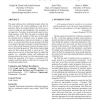Free Online Productivity Tools
i2Speak
i2Symbol
i2OCR
iTex2Img
iWeb2Print
iWeb2Shot
i2Type
iPdf2Split
iPdf2Merge
i2Bopomofo
i2Arabic
i2Style
i2Image
i2PDF
iLatex2Rtf
Sci2ools
101
click to vote
SIGDOC
2004
ACM
2004
ACM
Intellectual property aspects of web publishing
This paper addresses how intellectual property affects the Web in general, and content publishing on the Web in particular. Before its commercialization, the Web was perceived as being free and unregulated—this assumption is no longer true. Nowadays, content providers need to know which practices on the Web can result in potential legal problems. The vast majority of Web sites are developed by individual such as technical writers or graphic artists, and small organizations, which receive limited or no legal advice. As a result, these Web sites are developed with little or no regard to the legal constraints of intellectual property law. In order to help this group of people, the paper tries to answer the following question: What are the (typical) legal issues for Web content providers to watch out for? This paper gives an overview of these legal issues for intellectual property (i.e., copyrights, patents, and trademarks) and discusses relevant law cases. As a first step towards a mo...
| Added | 30 Jun 2010 |
| Updated | 30 Jun 2010 |
| Type | Conference |
| Year | 2004 |
| Where | SIGDOC |
| Authors | Holger M. Kienle, Daniel M. Germán, Scott R. Tilley, Hausi A. Müller |
Comments (0)

